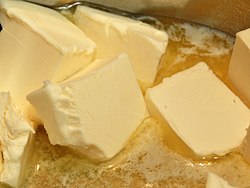 The Lurpak logo with two crossed lurs | |
| Product type | Butter |
|---|---|
| Owner | Arla Foods |
| Country | Denmark |
| Introduced | 23 October 1901 |
| Markets | Worldwide |
| Tagline | Good Food Deserves Lurpak |
| Website | lurpak |
Lurpak is a Danish brand of butter owned by Arla Foods. It is sold in over 75 countries worldwide, [1] and is known for its distinctive silver packaging. [2] Lurpak came into existence in October 1901 after a cooperative of several Danish dairy farmers decided to create and register a common brand and mark for butter to increase sales. [3] Its trumpetlike logo is based on the lur, an ancient brass instrument once used in Scandinavia. [4] [5]
Contents

Lurpak's principal market is the United Kingdom. [6]
Lurpak butter is made from milk, but their spreadable range contains rapeseed oil. [7]



